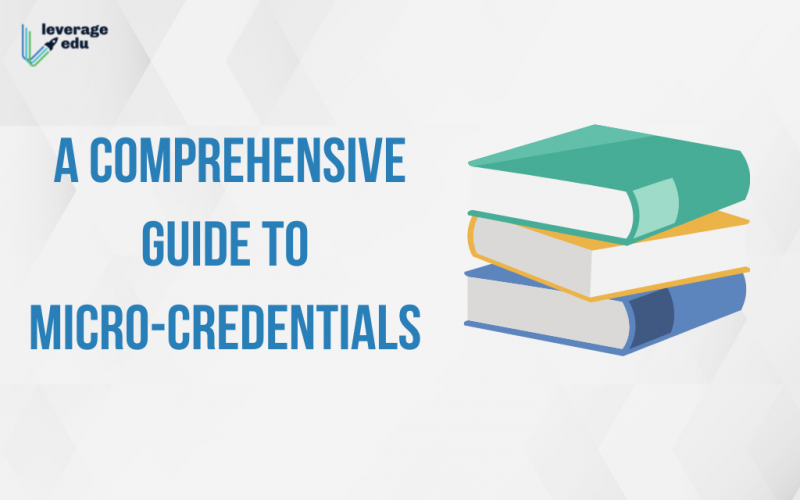The modern world is saturated with fierce competition. And if you want to do something great in your life, you need to stay at the top of the competition. Standing apart from the rat race generation is extremely important. One of the best ways to stay updated as well as ahead of the competitors is by focusing on your relevant area of study. But which method is most effective at achieving this? It’s by boosting the strengths of your skills. To know more about micro-credentials, keep reading this blog.
This Blog Includes:
What Does It Mean by Micro-Credentials?
In short, micro-credentials are bite-sized qualifications that are primarily focused on different types of skills. The micro-credentials are designed in a certified format. These courses are not only cost-effective, but also their duration is short-term. Unlike full-fledged diploma or degree courses where you need to be super committed, micro-credentials are less daunting and time-consuming. However, keep in mind that micro-credentials will work as an independent course of knowledge and you should not confuse them with a degree or diploma course. The primary objective of micro-credentials is to boost your knowledge and skills in your respective field.
Can Micro-Credentials Help You in Future?
The micro-credentials courses are offered both in hard and soft skills. They will work as mini-qualifications for candidates who want to further enhance their skills. Whether you’re a professional or a student, micro-credentials will undoubtedly help you in the future. While soft skills might include different types of courses such as presentation skills, productivity, email etiquette, critical thinking, leadership skills, etc. you can also go through hard skills such as digital marketing, coding, front-end development, social media marketer, etc. These skills will undoubtedly help you develop a stronger portfolio which will capture the attention of many potential employers in the job market. Not to mention, you can gain a competitive advantage.
How Does the Course Work?
When you’re done completing your micro-credential qualification, you will receive a digital badge which can be shared on your social media platforms, resume, and even on LinkedIn where potential employers can shortlist you by your micro-credentials. Keep in mind that even though these courses are extremely flexible, you have to complete certain modules or work hours to receive your badge. Depending on your chosen course, there might be webinars, lectures, or writer course materials that you need to study. Some specific courses also require the candidates to submit assignments so that people can know how well they’re adapting to the courses.
Advantages of Micro-Credentials
Given the fact that micro-credentials are super beneficial for your overall career scope and growth, here are some great benefits you need to know about the course.
- Accessibility: As the course is offered through online modules, you can use any device you want to access this course.
- Global: You can choose any international institution to pursue this course.
- Flexible: Flexibility is one of the best reasons why many candidates choose a micro-credentials course.
- Short-term: Unlike the bachelor’s or master’s degree, micro-credentials are short-term.
- Badges: Upon the completion of your course, you will receive badges that can boost your CV. The implementation of digital badging in higher education has further made it easy for students to share their achievements and skills on social platforms such as LinkedIn.
- Affordable: You don’t need to break the bank to pursue the micro-credential course. They are way cheaper than the full-fledged Diploma, UG, and PG courses.
- Competitive edge: You will gain a competitive edge once you complete this course. When employers find out that you’ve completed a micro-credential course, they will undoubtedly prioritise your CV as you have more knowledge and skills than other fresher employees.
- No age restrictions: This is another great advantage you need to know about micro-credentials. Despite your age and educational qualifications, you will face no barriers going through micro-credential courses.
Eligibility Criteria
The eligibility criteria for the micro-credentials will depend on the course you chose. This is why you will notice that the requirements are different from one course to another. Even though there are no official requirements that need to be fulfilled, there are some specific as well as super personal courses that might require some specific fundamental knowledge in terms of hard skills. However, if you’re going for soft skill training, you don’t need to fulfil any prior conditions.
Important Consideration When Choosing Micro-Credential
Since the course is considered a mini-degree, make sure you determine your primary purposes for earning the badge from this degree. Are you planning to acquire new skills or want to strengthen an already existing skill? If you’re choosing this course to cover a specific hard skill, make sure you consider the market value. You also need to understand how the new skill will complement your existing knowledge. Additionally, make sure the course is also capable of addressing your goals.
Want to study abroad but are worried about expenses? Let Leverage Finance help you
FAQs
The duration will depend on the hard and soft skills. Usually, it’s less than the other full-fledged programs.
Yes, employers will always prioritise your resume if they notice that you’ve completed micro-credential courses.
The course won’t cost more than the PG or UG courses.
If you want to get into a high-ranked university, you’ll need more than just good grades; you’ll also need flawless application because the competition is fierce. You may enlist the assistance of Leverage Edu specialists to assist you with the application process so that you can realise your goals. Call us immediately at 1800 57 2000 for a free 30-minute counselling session
 One app for all your study abroad needs
One app for all your study abroad needs
















 45,000+ students trusted us with their dreams. Take the first step today!
45,000+ students trusted us with their dreams. Take the first step today!
